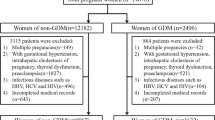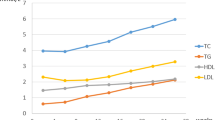Abstract
Background
This study is aimed to characterize changes in serum lipid levels throughout pregnancy and explore the association between lipid levels and neonatal outcomes.
Methods
This study included singleton pregnancy women who received regular prenatal care and delivered at Beijing Obstetrics and Gynecology Hospital from January 2014 to December 2014. Baseline information and neonatal outcomes were collected from medical record review. Serum lipid levels in the first trimester (7–13 weeks) and third trimester (>32 weeks) were measured. A multivariate regression model was constructed to examine the association between lipid levels and neonatal outcomes. Covariance structure analysis was conducted to explore the contribution of lipid profiles on birth weight.
Results
A total of 10 366 pregnant women were included in the analysis. Triglyceride (TG) and total cholesterol levels increased significantly from the first trimester to the third trimester. Triglyceride levels in both early and late pregnancy were significantly associated with an increased risk of macrosomia and preterm birth. Serum lipid levels in the first trimester significantly contributed to the lipid levels in the third trimester, while TG and high-density lipoprotein cholesterol in the third trimester were associated with birth weight.
Conclusion
Elevated TG levels throughout pregnancy were associated with an increased risk of preterm delivery and macrosomia. Serum lipid levels in the third trimester are mainly accounted for by their levels in the first trimester and are also associated with birth weight.
Similar content being viewed by others
References
Herrera E, Ortega-Senovilla H. Lipid metabolism during pregnancy and its implications for fetal growth. Curr Pharm Biotech. 2014;15(1):24–31.
Herrera E, Ortega-Senovilla H. Maternal lipid metabolism during normal pregnancy and its implications to fetal development. Clin Lipidol. 2010;5(6):899–911.
Retnakaran R, Ye C, Hanley AJ, et al. Effect of maternal weight, adipokines, glucose intolerance and lipids on infant birth weight among women without gestational diabetes mellitus. CMAJ. 2012;184(12):1353–1360.
Nelson SM, Matthews P, Poston L. Maternal metabolism and obesity: modifiable determinants of pregnancy outcome. Hum Reprod Update. 2010;16(3):255–275.
Silveira PP, Portella AK, Goldani MZ, Barbieri MA. Developmental Origins of Health and Disease (DOHaD). J Pediatr (Rio J). 2007;83(6):494–504.
Schaefer-Graf UM, Graf K, Kulbacka I, et al. Maternal lipids as strong determinants of fetal environment and growth in pregnancies with gestational diabetes mellitus. Diabetes Care. 2008;31(9):1858–1863.
Gluckman PD, Hanson MA. Living with the past: evolution, development, and patterns of disease. Science. 2004;305(5691):1733–1736.
Emet T, Ustuner I, Guven SG, et al. Plasma lipids and lipoproteins during pregnancy and related pregnancy outcomes. Arch Gynecol Obstet. 2013;288(1):49–55.
Sommer C, Sletner L, Morkrid K, Jenum AK, Birkeland KI. Effects of early pregnancy BMI, mid-gestational weight gain, glucose and lipid levels in pregnancy on offspring’s birth weight and subcutaneous fat: a population-based cohort study. BMC Pregnancy Childbirth. 2015;15:84.
Jin WY, Lin SL, Hou RL, et al. Associations between maternal lipid profile and pregnancy complications and perinatal outcomes: a population-based study from China. BMC Pregnancy Childbirth. 2016;16:60.
Wild R, Weedin EA, Wilson D. Dyslipidemia in pregnancy. Cardiol Clin. 2015;33(2):209–215.
Geraghty AA, Alberdi G, O’Sullivan EJ, et al. Maternal blood lipid profile during pregnancy and associations with child adiposity: findings from the ROLO study. PLoS One. 2016;11(8):e0161206.
Schaefer-Graf UM, Meitzner K, Ortega-Senovilla H, et al. Differences in the implications of maternal lipids on fetal metabolism and growth between gestational diabetes mellitus and control pregnancies. Diabet Med. 2011;28(9):1053–1059.
Kushtagi P, Arvapally S. Maternal mid-pregnancy serum triglyceride levels and neonatal birth weight. Int J Gynaecol Obstet. 2009;106(3):258–259.
Whyte K, Kelly H, O’Dwyer V, Gibbs M, O’Higgins A, Turner MJ. Offspring birth weight and maternal fasting lipids in women screened for gestational diabetes mellitus (GDM). Eur J Obstet Gynecol Reprod Biol. 2013;170(1):67–70.
Ortega-Senovilla H, Alvino G, Taricco E, Cetin I, Herrera E. Enhanced circulating retinol and non-esterified fatty acids in pregnancies complicated with intrauterine growth restriction. Clin Sci. 2009;118(5):351–358.
American Diabetes A. Standards of medical care in diabetes— 2014. Diabetes Care. 2014;37(suppl 1):S14–S80.
Laughon SK, McLain AC, Sundaram R, Catov JM, Buck Louis GM. Maternal lipid change in relation to length of gestation: a prospective cohort study with preconception enrollment of women. Gynecol Obstet Invest. 2014;77(1):6–13.
Wang C, Zhu W, Wei Y, et al. The associations between early pregnancy lipid profiles and pregnancy outcomes. J Perinatol. 2017;37:127–133.
Vrijkotte TG, Krukziener N, Hutten BA, Vollebregt KC, van Eijsden M, Twickler MB. Maternal lipid profile during early pregnancy and pregnancy complications and outcomes: the ABCD study. J Clin Endocrinol Metab. 2012;97(11):3917–3925.
King JC. Maternal obesity, metabolism, and pregnancy outcomes. Ann Rev Nutr. 2006;26:271–291.
Liu B, Geng H, Yang J, et al. Early pregnancy fasting plasma glucose and lipid concentrations in pregnancy and association to offspring size: a retrospective cohort study. BMC Pregnancy Childbirth. 2016;16:56.
Herrera E. Lipid metabolism in pregnancy and its consequences in the fetus and newborn. Endocrine. 2002;19(1):43–55.
Zilberlicht A, Feferkorn I, Younes G, Damti A, Auslender R, Riskin-Mashiah S. The mutual effect of pregestational body mass index, maternal hyperglycemia and gestational weight gain on adverse pregnancy outcomes. Gynecol Endocrinol. 2016;32(5):416–420.
Li G, Kong L, Zhang L, et al. Early pregnancy maternal lipid profiles and the risk of gestational diabetes mellitus stratified for body mass index. Reprod Sci. 2015;22(6):712–717.
Ankumah NE, Sibai BM. Chronic hypertension in pregnancy: diagnosis, management, and outcomes. Clin Obstet Gynecol. 2017;60(1):206–214.
Jain L. Effect of pregnancy-induced and chronic hypertension on pregnancy outcome. J Perinatol. 1997;17(6):425–427.
Mutsaerts MA, Groen H, Buiter-Van der Meer A, et al. Effects of paternal and maternal lifestyle factors on pregnancy complications and perinatal outcome. A population-based birth-cohort study: the GECKO Drenthe cohort. Hum Reprod. 2014;29(4):824–834.
Preacher KJ. Advances in mediation analysis: a survey and synthesis of new developments. Ann Rev Psychol. 2015;66:825–852.
Cole DA, Maxwell SE. Testing mediational models with longitudinal data: questions and tips in the use of structural equation modeling. J Abnorm Psychol. 2003;112(4):558–577.
Author information
Authors and Affiliations
Corresponding author
Rights and permissions
About this article
Cite this article
Zheng, W., Huang, W., Zhang, L. et al. Changes in Serum Lipid Levels During Pregnancy and Association With Neonatal Outcomes: A Large Cohort Study. Reprod. Sci. 25, 1406–1412 (2018). https://doi.org/10.1177/1933719117746785
Published:
Issue Date:
DOI: https://doi.org/10.1177/1933719117746785




